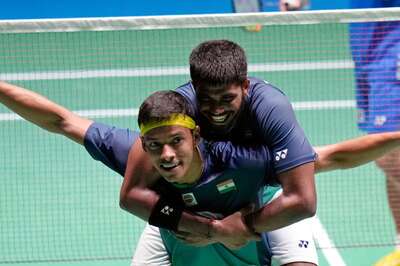
views
New Delhi: Prime Minister Narendra Modi on Thursday said the ties between India and Japan have become stronger from the time the two countries cooperated to make a car to coming together to manufacture bullet trains.
Addressing the Indian community in Kobe, Modi said Japan has played an important role in India's economic development, adding that the bilateral ties will become more robust as India aims to become a $5-trillion economy in the next five years.
"There was a time when we were collaborating in building cars and today we are collaborating in building a bullet train," said Modi who will attend the G20 Summit to be held in Osaka from Friday.
"Today there is no such part of India where Japan's projects or investments have not left its mark. Similarly talent and manpower of India are contributing to strengthen Japan," he told the Indian diaspora which gave him a rousing welcome.
Had a wonderful community programme in Kobe. Interacting with the Indian diaspora is always special. Here are some glimpses. pic.twitter.com/m2OHLwQjWT— Narendra Modi (@narendramodi) June 27, 2019
During his visit to Kobe, Modi also witnessed the exchange of Letter of Intent on Ahmedabad-Kobe Sister City Partnership.
India is planning to run its first bullet train between Mumbai and Ahmedabad with Japan's help. The first stretch of the ambitious project is expected to be completed by 2022. The National High Speed Rail Corporation Limited (NHRSCL) is in the process of acquiring land for the 508-kilometer project.
Modi also thanked the Indian diaspora for being part of the world's largest democratic process, which saw the participation of 61 crore voters.
"When it comes to India's relationship with the world, Japan has an important place in it. This relationship is dated back to centuries. There is a sense of belonging, goodwill and respect for each other's culture and civilization," Modi said. "Almost two decades ago, Prime Minister Atal Bihari Vajpayee and the then Japanese premiere Yoshiro Mori together made our relationship as a global partnership. After becoming Prime Minister in 2014, I got a chance to strengthen our friendship with my dear friend Prime Minister Shinzo Abe. This relationship will become stronger in New India".
"For the first time since 1971, the country has given a pro-incumbency mandate to a government. This victory was the victory of truth and democracy," he said.
Modi noted that 61 crore voters, 10 lakh polling stations, over 40 lakh Electronic Voting Machines (EVMs), and more than 8,000 candidates took part in the world's largest democratic process. The number of voters who participated in the Lok Sabha elections exceeded the population of almost all countries, barring China, he said.
Modi also noted the contribution of Swami Vivekananda, Rabindranath Tagore, Mahatma Gandhi, Netaji Subhas Chandra Bose, Justice Radhabinod Pal and many other Indians in strengthening India's relationship with Japan.
"A government with majority is an advantage in foreign relations... The mandate (given to us) to fulfil the hopes and aspirations of new India will give a fillip to our relations with the world. The mantra of 'sabka saath, sabka vikas aur sabka vishwaas' that we are following will help strengthen the world's trust on India," Modi said.
Abe backs Modi's efforts
Japanese Prime Minister Shinzo Abe, meanwhile, backed Modi who is pressing the G20 members that they should deal with the issue of fugitive economic offenders as part of the powerful grouping's anti-corruption measures.
Ahead of the G20 summit on Friday, Modi held wide-ranging talks with Abe on the global economy, issues of fugitive economic offenders and disaster management.
Briefing reporters on the Modi-Abe meeting, Foreign Secretary Vijay Gokhale said, "Prime Minister Abe initially began with the expectations from the G20 meeting, he spoke about the importance of focusing on the global economy, he referred specifically to Prime Minister's initiative at earlier G20 meetings on the issue of fugitive economic offenders and he said that the G20 should deal with this problem as part of the anti-corruption measures."
The Modi government has initiated steps to extradite economic offenders from countries like the UK. Efforts are on to bring back liquor baron Vijay Mallya and diamond merchant Nirav Modi as well as Mehul Choksi from abroad.
Indian investigative agencies are probing Nirav Modi and his uncle Choksi for alleged money laundering and corruption to defraud the Punjab National Bank (PNB) to the tune of over Rs 13,000 crore. The duo has been absconding since the alleged bank fraud, by far the highest in India in terms of value, came to light last year.
Mallya is facing fraud and money laundering charges amounting to Rs 9,000 crore.
Began the series of interactions in Osaka with an excellent meeting with my friend, PM @AbeShinzo. Our talks covered the full range of India-Japan relations. Extensive cooperation between India and Japan augurs well for the citizens of our countries and the entire world. pic.twitter.com/GgnjtYV7Wt— Narendra Modi (@narendramodi) June 27, 2019
(With inputs from PTI)


















Comments
0 comment